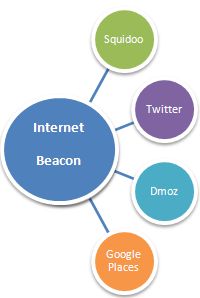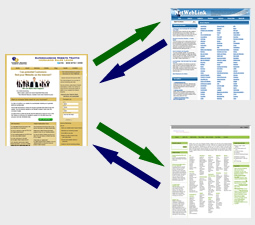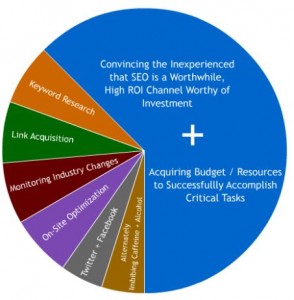Archive for the ‘Search Engine Optimization SEO’ Category
Description of ‘Search Engine Optimization SEO’ Category:
The method of improving the volume and quality of traffic to your website from Search Engines.
Thursday, August 23rd, 2012
The Land of the Penguin, Everything is Black and White
Over the past year or so, Google has pushed some major changes in the form of an algorithmic update called Penguin (and just before it, another called Panda) that had a pretty single-minded purpose; to draw a line in the sand and call everything on the wrong side of the line ‘black’. Penguin actually changed almost nothing about the rules of good website marketing (though Panda did) — Penguin’s (very nearly) single purpose was to punish specific kinds of link-building behavior.
Google refers to the links it punishes as “questionable”. According to the law of the Penguin, a “questionable” link is one that:
- Has anchor text that is an exact match to the anchor text in the majority of your incoming links, particularly if the content that is linking is low-quality content.
- The link comes from an auto-approve, non-moderated blog — again, particularly if the content on that blog is of lower-than-average quality.
- OR, the link comes from a web site that has a significant number of outgoing links and no real traffic to speak of. (BuildMyRank, anyone? BuildMyRank deindexed)
These things seem relatively banal and minor, but if you’re a Search Engine Optimization (SEO) wonk, you’re already wincing. You can see between the lines that most links that may have been the SEO-baseline before Penguin are now out:
- Autoblogs? Nope.
- Site directories that few people use (i.e. a lot of them)? Useless.
- Even ubiquitous SEO toolbox items like optimizing for a specific keyword on each page got hit
- now you must spread your keywords around on every page or you’re flirting with the Google sandbox.
Paradigm Shift
The result of the Panda / Penguin double-punch has been profound across the field of SEO. It’s no longer about ranking as high as you can, as quickly as you can. It’s not even about deep research into your competitor’s backlink structure so that you can out-backlink them in an Olympic-style speed-back-linking event. (If you did SEO… Read the rest
Tags: Google, google penguin, seo
Posted in Google, Search Engine Optimization SEO | 2 Comments »
Monday, August 6th, 2012

Not that long ago, it wasn’t all that difficult to optimize a website for a search engine. Before there was Penguin or Panda, there was color. Or rather, there were shades of gray – areas that weren’t quite white-hat but weren’t black-hat enough for Google to penalize you for using them.
SEO wasn’t easy, per se, but it was easier.
The rules were more simple:
- Post decent content.
- Optimize your content for high-traffic, low-competition keywords with selling connotations.
- Don’t use obvious black-hat techniques like link-bombing.
- Build backlinks to your website. The more the better.
- Pack your keywords as dense as Google will let you (about 2% for most niches).
There were obviously details for each of these rules, but by and large, you could become an ‘SEO expert’ in a matter of weeks if you dedicated yourself to learning them. It might take a while to actually optimize a website, but it could actually be done by a single person working just a little overtime full time for a few weeks.
The most difficult parts of ‘old style’ SEO were producing content, some folks even outsourcing to writers off shore, like in India and the Philippines that spoke (or rather wrote) English just well enough to get Google to understand what they intended their topic to be. You could outsource an article overseas, and while with most of this content any English-speaking human that read it would laugh and click away, the search engine spiders didn’t mind the off syntax, so it worked.
Link-building was largely a matter of using automated systems that could mass-produce backlinks for you and hiring more outsourced link-builders to create those links that couldn’t be automated. SEO companies in the US often did the ‘hard’ work of producing quality content – the pieces that you expected people to read and that you put your company logo on – while they outsourced other content.
Then along came Penguin and before that its older brother Panda, and everything changed. Since we’re going to focus specifically on the Penguin update next week, let’s do a little bit of ‘in-between’; the… Read the rest
Tags: seo
Posted in Google, Search Engine Optimization SEO, Search Engines | 2 Comments »
Friday, November 11th, 2011
In any type of business there is always competition, some industries just face more of it than others. If you are like most people then you probably have a hard time dealing with the stress brought on by your competitors. If you feel this way about competition it is completely normal but if you know how to use your competitors to your advantage you can almost always turn this into a positive feeling. Competition isn’t all bad because it helps us to better ourselves or our business because it plays off our relentless desire to be the best that we can be.
 With Search Engine Optimization the goal is to have your website ranked the highest and receive the most traffic or conversions. Being the most prominent and relevant website is crucial to the success of most businesses. The competing websites that you encounter when performing your SEO may seem like a bad thing, however they can almost always assist you in making better internet marketing decisions. It may seem sneaky to spy on your competitors but it has become a common practice and competitive analysis is a crucial component to website marketing. Knowing who your competitors are and how they are conducting their SEO can provide you with some very valuable marketing data. Below is a short list of how you can benefit from exploring the trends and movements of the top competitors for yours or your client’s website. With Search Engine Optimization the goal is to have your website ranked the highest and receive the most traffic or conversions. Being the most prominent and relevant website is crucial to the success of most businesses. The competing websites that you encounter when performing your SEO may seem like a bad thing, however they can almost always assist you in making better internet marketing decisions. It may seem sneaky to spy on your competitors but it has become a common practice and competitive analysis is a crucial component to website marketing. Knowing who your competitors are and how they are conducting their SEO can provide you with some very valuable marketing data. Below is a short list of how you can benefit from exploring the trends and movements of the top competitors for yours or your client’s website.
Social Media:
Social Media is probably the easiest place to start. Check out what social networking sites that your competitors are using and see which ones would be beneficial to your website. In addition see how they are using these sites to communicate with their audience and what type of content they offer on their social pages. Identifying how your competition is using these platforms is a great way to get an idea of what people like, what they don’t like, what is successful, what isn’t successful, and what you can be doing that they aren’t.
Meta… Read the rest
Tags: backlinks, competition, competitors, competitve analysis, Internet Marketing, keywords, seo
Posted in Internet Marketing, Search Engine Optimization SEO | 7 Comments »
Thursday, October 20th, 2011
As we have mentioned numerous times before one of the most important aspects of Search Engine Optimization is accumulating high quality backlinks. Backlinks are incoming links to your web pages and serve as an essential building block of a successful SEO strategy. Also known as inbound links, backlinks are important because they help indicate the popularity of your website and help to direct or drive in a high amount of new traffic. Websites are determined more relevant depending on the types of website as well as the quantity of websites that provide a backlink. Search engines like Google will often contribute more credit and place a higher rank on a website that contains a higher number of good quality links. 
Search engines determine the relevance of a website associated with a keyword according to its collection of backlinks and the anchor text used within the backlink. The anchor text of a back link is very important when gathering these links because it denotes the subject of the page and helps target your specific audience. One of the ways to acquire a backlink is guest blogging efforts. As we briefly mentioned in our past blog post, guest blogging is when another website hosts one or your articles or when you showcase an article from another blogger.
Why Guest Blogging:
Guest blogging is a great device to drive in traffic to your website and allows you to network with other bloggers from your industry. Besides driving in new traffic and networking with other bloggers, guest blogging also helps with branding and getting your name or company in the spotlight. Guest blogging is also helpful in building your social media profile and gaining more industry experience.
When to Guest Blog:
How do you know when you are ready for guest blogging? You should wait until you have established a well written blog and have confidence in your blogging abilities. When you guest blog you should do it… Read the rest
Tags: anchor text, backlinks, blog, blog post, guest, guest blog, guest blog post, guest blogger, guest blogging
Posted in Backlinks, Blog Hints, Internet Marketing, Search Engine Optimization SEO | 3 Comments »
Friday, September 23rd, 2011
 Recently we have been discussing backlinks and the benefits that they provide for your website. Backlinks are an essential part of the SEO process because they help your site’s search engine visibility and web rank. A backlink, also known as an inbound link is a link on another website that is directed to one of your web pages. Recently we have been discussing backlinks and the benefits that they provide for your website. Backlinks are an essential part of the SEO process because they help your site’s search engine visibility and web rank. A backlink, also known as an inbound link is a link on another website that is directed to one of your web pages.
When search engines like Google determine a website’s relevance for an associated keyword, they consider the quantity and quality of inbound links to that site. Inbound links with content related to your site they are thought to be more relevant and a more valuable SEO factor. In short, websites with the most relevant content to your website will produce the best quality inbound links.
High quality links are obtained through a number of different methods, one of which is leaving comments on other blogs. In addition to looking good in the eyes of the search engines, leaving your website’s URL on industry related blogs is a good way to direct new users to your content. For several reasons however leaving blog comments will not always produce the preferred results. The following are explanations why blog comments don’t always help your search engine optimization efforts as well as some of the things you should look for when pursuing blog comment backlinks.
Why Blog Comments Sometimes Don’t Help:
The impact that blog comments have on SEO depend on both the blog’s restrictions and the type of comment that you post. Some of the reasons why the comments that you leave on blogs might not contribute to your SEO are
- If Your Comment Appears As Spam:
Most blogs require that you use a human name when leaving a comment on their posts. The name you use to post is extremely important, having a too common name or using a company name will often be ignored. Sometimes blogs will even state that you must use a real name in order for your… Read the rest
Tags: blog, blog comments, inbound link, link juice, no follow
Posted in Backlinks, Blog Hints, Search Engine Optimization SEO | No Comments »
Friday, September 16th, 2011
Constructing a website for a business is only the first part of attracting your online customers. There are many factors that determine your position on the search engine results page, one of them being the quality and quantity of your inbound links. In order to increase traffic and gain a good web rank your website should have a significant amount of backlinks. These backlinks should connect with valuable, authoritative, and industry related websites. Gathering backlinks should be a top SEO priority because without them it can be extremely hard to move up in the search engine results or generate more website visibility.
There are a number of ways to build backlinks to your webpages, one of which we mentioned in our previous blog entry, “Reciprocal Linking”. Reciprocal or two way linking is when two websites agree to exchange links with each other. However linking doesn’t always have to be mutual, this type of linking is called one way linking. The following list provides some popular sources and methods of obtaining one way links.
Create Superior Content and Resources:
In addition to creating a visually appealing and easy to use website you will also need to have high quality content or linkbait to draw the attention of visitors. This content is used to influence visitors to link back to your website by sharing your content. When other websites share your content on their website they will typically link back to the original source.
- Create 101 articles that describe the basics of your industry related subject.
- Create Top 10 or 100 lists.
- Lists the top professionals from your industry.
- Create an infographic that displays industry information in an intriguing and exciting way.
- Create free helpful online tools or downloadable software programs.
Start a Blog:
A blog is a handy instrument when it comes to gaining momentum and popularity over the Internet. A Blog has many benefits for example it is an excellent way to reach existing clients and find new… Read the rest
Tags: backlinks, blog, content, inbound links, Links, search engines, Social Media
Posted in Backlinks, Internet Marketing, Search Engine Optimization SEO | 2 Comments »
Friday, September 9th, 2011
If done correctly anchor text and reciprocal links can have a tremendous positive impact on SEO. These two concepts work together to provide valuable link value to your website and have the potential to increase your website ranking.

In our last blog entry “Creating Infographics to Build Links and Increase SEO” we briefly touched on the topic of Anchor text. The anchor text is the hyperlink or clickable text that is found on a web page. Using accurate anchor text is essential for good Search Engine Optimization and when used appropriately it can drastically boost your rankings in the search engines. The anchor text provides descriptive and useful information for the page that it links with.
The anchor text enables websites to use cleaner looking text rather than displaying an unpleasant and distracting hyperlink. For example a hyperlink for Internet Beacon.com would look like <a href=”http://www.internetbeacon.com”> Internet Beacon</a> however by using anchor text it would present as Internet Beacon on the page.
The most common mistake when dealing with anchor text is using the dreaded “Click Here” anchor text. Click here not only causes you to miss out on the possible SEO benefits it also neglects to describe the content to the page visitors and the search engine crawl bots. At one time Anchor text was heavily manipulated and was referred to as Google Bombing. Google Bombing used large amounts of anchor text to influence the rank of a link that directed visitors to unrelated content. For example during the 2004 United States presidential election the anchor text of “miserable failure” was linked to the George W. Bush‘s White House biography so many times that when users searched for the terms miserable failure the link to the biography appeared in Google’s search results. However in January, 2007, Google created a new algorithm which reduced the impact of Google bombs but none the less anchor text still remains important… Read the rest
Tags: anchor text, hyperlink, link, reciprocal links, search engine
Posted in Internet Marketing, Search Engine Optimization SEO | No Comments »
Friday, September 2nd, 2011
What is an Infographic? An infographic is a pictorial representation of specific data or knowledge. Infographics can be a great way to showcase information on a particular subject area and can prove to be a good source of link value. Infographics have the ability to transform plain material into interesting and exciting web content. Over the past few years the value of infographics has grown tremendously because many have begun to recognize the potential they have to connect with their target audience.

from http://www.seomoz.org/blog/4-essential-seo-infographics, September 2011
Link value or link juice is a term often used in Search Engine Optimization and refers to the amount of value that the search engines like Google attribute to a website or link. Link juice is assigned to web pages and is dispersed throughout a website based on how well your website is optimized. The more links and most importantly the more high quality links a website has directly translates into the more link juice a website is likely to have.
When talking about Links it is important to understand some important fundamentals. Total links quantity indicates the total number of links that your website or webpage possesses. The merit of these links can vary which brings us to the linking source. The linking source describes who is linking to your content and how credible or trustworthy they are. The sites that have a higher rank will pass on more value than those with a lower web rank. Even though the websites with a higher rank may provide more value it is also important to have diversity among your links. It’s ok to have links from lower ranked pages as long as there is a balance between link values.
Another major factor with links is anchor text. The anchor text is the keywords and descriptions other websites use when linking to your content. Accurate anchor text is essential for good SEO. You want something that describes your content well and not something like “Click… Read the rest
Tags: anchor text, backlinks, content, infographics, link juice, link value, linkbait, Links, seo, seo infographics
Posted in Backlinks, Internet Marketing, Search Engine Optimization SEO, Social Media Marketing | No Comments »
Friday, August 26th, 2011
One of the most important elements of creating a website is selecting a proper domain name. A domain name is commonly part of a larger Internet address called a “URL”. Having the right domain name for your website can significantly help establish an online reputation and generate greater visibility. Domain names give both the human visitors as well as the search engines the first description or impression of the website. Choosing a domain name can often be just as important as deciding the name of your business and should not be taken lightly. Finding a successful domain name will require time, patience, and creativity. The following tips are designed to assist in creating successful domain names.
Best Practices for Creating a Domain Name:
- Describe Your Website by Matching Your Domain, Website, and Company Name
A domain name is one of the first elements of a website that visitors see. Matching your domain with your company name will help target your existing as well as potential customers. Having a company and domain that describes your website will also let people know what the website is about and draw in targeted traffic. For example with the domain www.DeliciousPastries.com Delicious Pastries is the company name, website name, domain name, and also highlights Pastries a major descriptive keyword.

- Keep it Short and Readable-
There are several incentives for keeping your Domain name short which include it being easy to type, easy to remember, and easier to travel by word of mouth. A domain name that is longer than 3 words should use hyphens. However a domain name with more than 3 words and hyphens will raise the websites level of spamminess.
Having a keyword in your domain name will help rank not only because it is part of your domain but also because it is the anchor text that others will use to link back to your website.
- Alternative Domain Top Level Domains (TLD)
It’s recommended that you only purchase the .Com version of your… Read the rest
Tags: domain, domain names, internet, keywords, seo, url, urls, website
Posted in Internet Marketing, Search Engine Optimization SEO, Web Development | 1 Comment »
Friday, August 19th, 2011
One of the most important and easiest Search Engine Optimization concepts is keyword placement. SEO Keyword placement refers to the integration of targeted keywords into locations on and off the webpage. Keywords or key phrases are generated to represent the terms that users search for when trying to locate your company and website. A website using the wrong or inaccurate keywords is as equally bad as a website that ignores keywords all together.

Keyword Cloud
Having accurate and descriptive keywords however is only the first part of the equation. Once you establish a list of relevant keywords they then need to be strategically placed throughout the website in order to increase traffic. Each individual page of your website should be optimized for one to three unique keywords. Selecting keywords along with the placement of these keywords is crucial in order to increase your website’s visibility and guide targeted traffic directly to your website. Below are the 10 most important positions to consider when performing keyword placement.
Where to Use Keywords:
It is recommended that you always place your keywords near the beginning of the title tag. Not using your keywords in the website’s title tag can make it extremely difficult to rank for your targeted keywords. Keyword placement in the title tag is thought to be the most important search engine ranking factors, each page title should be unique to that page and optimized for that specific keyword.
Although the Meta Description Tag seems to play a very little role in the actual search engine ranking it can still be used to influence potential customers to visit your website. Any keywords that your description tag has in common with the search query will appear bolded in the Search engine results page (SERP). Similar to the title tag each page should also have a unique description tag that targets only 1-2 keywords.
… Read the rest
Tags: Internet Marketing, keyword, keyword placement, keywords, Links, search engine, seo, website
Posted in Internet Marketing, Search Engine Optimization SEO, Web Tips | No Comments »
|
Why Blog Comment Backlinks Don’t Always Help Your SEO
Friday, September 23rd, 2011When search engines like Google determine a website’s relevance for an associated keyword, they consider the quantity and quality of inbound links to that site. Inbound links with content related to your site they are thought to be more relevant and a more valuable SEO factor. In short, websites with the most relevant content to your website will produce the best quality inbound links.
High quality links are obtained through a number of different methods, one of which is leaving comments on other blogs. In addition to looking good in the eyes of the search engines, leaving your website’s URL on industry related blogs is a good way to direct new users to your content. For several reasons however leaving blog comments will not always produce the preferred results. The following are explanations why blog comments don’t always help your search engine optimization efforts as well as some of the things you should look for when pursuing blog comment backlinks.
Why Blog Comments Sometimes Don’t Help:
The impact that blog comments have on SEO depend on both the blog’s restrictions and the type of comment that you post. Some of the reasons why the comments that you leave on blogs might not contribute to your SEO are
Most blogs require that you use a human name when leaving a comment on their posts. The name you use to post is extremely important, having a too common name or using a company name will often be ignored. Sometimes blogs will even state that you must use a real name in order for your… Read the rest
Tags: blog, blog comments, inbound link, link juice, no follow
Posted in Backlinks, Blog Hints, Search Engine Optimization SEO | No Comments »